#HxH Meta
Explore tagged Tumblr posts
Text



oh.



oh.


OH.
#like not to be captain obvious but#the girls are foilinggggg#hxh spoilers#hxh manga spoilers#hxh mangacap#succession war arc#hxh meta#kurapika#yorknew city#phantom troupe#hxh#hunter x hunter#screeds#hxh 406#chrollo lucilfer
771 notes
·
View notes
Text
HxH: The Apology You Didn't See
Gon, with his whole heart, apologizes to Killua after the Chimera Ant arc.


This whining on the floor scene is not his apology. It is a reaction to Killua bringing up the things that hurt him, after they undoubtedly talked about it, and rubbing salt into Gon’s guilt-ridden wounds. Notice that Gon doesn’t complain or say, “I already said sorry!” He just gets to his knees and apologizes, again. He is owning his mistakes, the ones Killua isn’t yet ready to let go of entirely, and Alluka scolds him for it. Her calling him out is the only reason Killua backtracks and says the most important line that proves a significant scene occurred between them off-screen: “You already apologized.”
In both the anime and the manga, the Japanese clearly says it: もう謝ってもらったし

The “mou” is the “already,” and interestingly enough, it’s put into a list by the use of “shi,” which functions a bit like “and” might: You apologized to me and Alluka is free because of you, by the way, she healed you.
Both Gon’s apology, and Alluka’s freedom, are clearly topics they’ve discussed before. Her ability is not. Why does he suddenly reveal it at this time? Unfortunately, this post isn’t about that; it’s about the apology we didn’t see, and more importantly, the promise we didn’t hear.
How do we know there was a promise?
Ging Freecss told us.
For all his flaws as a father, Ging gave Gon some solid advice about apologizing to one’s friends. There are rules. It’s more than just saying “sorry.” You have to say what you did, and more importantly, make a promise: you promise them what you’ll do next time, and then you keep that promise, no matter what.
It’s so important to Ging that Gon understands this, because even after telling him about Kaito’s ability, he tacks on: 謝り方間違えんなよ!!

It’s not just “don’t mess up your apology (or you'll be sent flying)," it’s “don’t mess up the way you apologize.” The action instead of the noun.
On his way to Kaito, thinking about his apology, we learn that Gon is thinking about Killua too. He tells Leorio that he owes Killua an apology because he said some really terrible things to him when he got all messed up fighting the enemy. Gon is highly aware he hurt his friend. He is not oblivious.

When Gon finally meets Kaito, we see him put his new knowledge of apologies into action. He says sorry, and when Kaito prompts, “What for?” Gon explicitly lays out what’s eating him up, “For not being able to fight alongside you, for not being strong enough. Next time, I’ll protect you!” He carries out the apology as best he can, even inspiring an eavesdropping ant to later own his mistakes to Kaito too.

The scene with Kaito is proof that Gon knows how to apologize to his friends, and that he is serious about making up for his faults. It’s existence is evidence that Gon apologized to Killua and made a promise to him too.
But why didn’t we get to see it? In my opinion, there are two potential reasons.
Reason 1: Togashi wants to leave it to our imagination.
It’s not uncommon for Japanese media to shy away from providing a perfectly polished emotional pay-off. Even in the romance genre, confessions are rarely explicit. The words “I love you!” might come out as, “The moon is beautiful tonight.” We know that Gon and Killua share an intense bond, and Togashi is well aware that people view their relationship through various lenses; to keep the apology and promise hidden, it allows each fan to insert what would make them happiest into the missing scene. It’s not a cop-out so much as a standard of Japanese storytelling. What can you read into the situation from what’s been implied? From the subtle? Between the lines?
It’s true that there might be a "right" answer in Togashi’s mind, but if he’s chosen to be vague intentionally for the sake of keeping fans content, we’ll never know it.
Unless!
Reason 2: Togashi will reveal the promise to us at a later date.
It has happened multiple times throughout the series that an event occurred, but we didn’t learn the details of the event until later. Just as an example off the top of my head, when Gon is knocked out in the final round of the Hunter Exam, Satotz has to tell him what happened after he wakes up. Even in that re-telling of events, another seed of mystery is planted when Gon learns that Hisoka gave up his match after whispering something in Kurapika’s ear. We don’t find out what it was for several more episodes. Togashi has deliberately kept information from readers for the purpose of future storytelling, and this might be one of those moments.
It’s very possible we’ll discover what Gon’s promise was to Killua in the future, and I wouldn’t be surprised if we found out about it from a 3rd party, like Alluka.
So, we know an apology was said and a promise made, but why did they have to separate?
That’s tied to the promises they’ve already made that we do know about.

Back in episode 38 of the anime, when leaving Whale Island, Gon tells Aunt Mito he’ll return after he’s met Ging. In episode 146, Killua tells Alluka he’s going to protect her from their family. As much as they want to stay together, and as much as we the viewers want them to stay together, it’s not the next right thing for them to do. It’s painful, but they need to spend some time apart. The day will come when they can be reunited. Alluka says it, Gon and Killua say it, and the lyrics of the song overlaying their parting say it:
いるよ 傍に 一番近く / I’m here, as close as I can be
今は ただそれだけでいいから / For now, that’s enough
いつかそっと 言いかけた / One day, you told me [about it] quietly,
夢の続きを 聞かせてよ / Let me hear the rest of that dream


The vows they made to each other under the stars are not forgotten. Their separation only feels so long because Togashi’s health has made producing his manga inconsistent. Send him healing vibes, and be reassured that Gon and Killua will meet again. ♡
#hxh#hxh meta#media analysis#media literacy#killua zoldyck#gon freecss#killugon#gonkillu#hunter x hunter#The Defense of Gon Freecss#I think it’s such a disservice to Gon’s character to believe he is a bad friend or that he didn’t apologize#How did he apologize? That’s what fanfiction is for#I'm writing the fanfiction
203 notes
·
View notes
Text
muruem and killua both on their knees begging palm to save their beloved komugi and gon. I just realized this parallel today and im unwell.
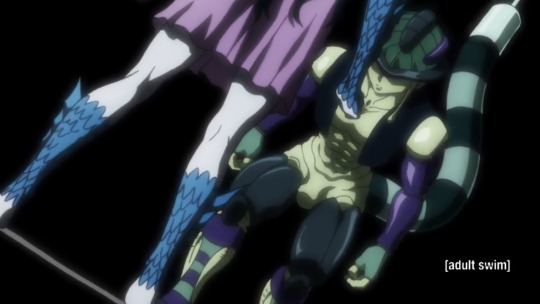
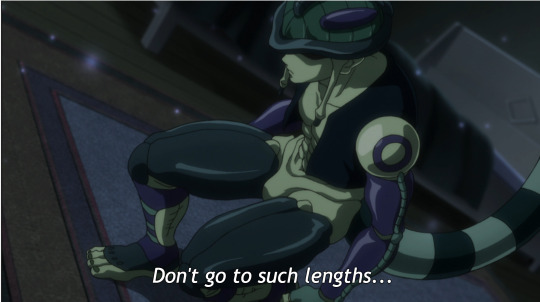
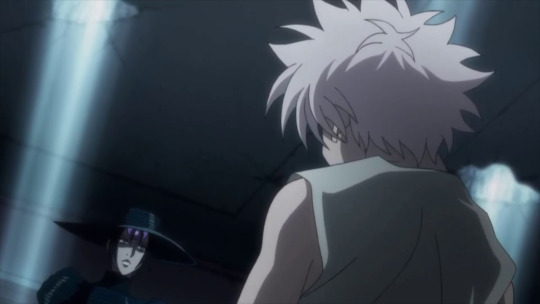
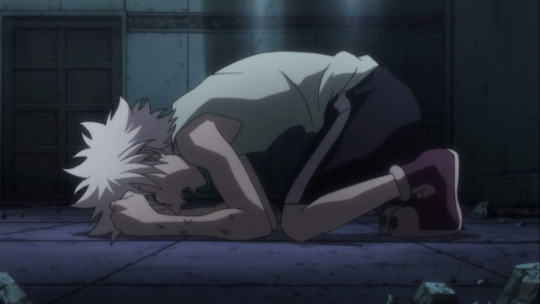
togashi created palm to facilitate the new themes of love and coming of age in the chimera ant arc. and created multiple parallels between the two pairs
#I have more thoughts on this and might write a longer thing analyzing palms role but theres a reason for everything#hxh#hunter x hunter#killua zoldyck#mureum#komugi#gon freecss#killugon#meruem and komugi#oumougi#hxh meta#hunter x hunter meta#chimera ant arc#palm siberia#rant#merukomu#chimera ant king#Killua#Gon
993 notes
·
View notes
Text
Thinking about the Freecss family and losing my mind. A lineage of selfishness, a family of people who leave and are left behind.
Ging's father disappeared at sea, Mito's parents left the island only to die unexpectedly, Ging's famous abandonment, even further then that Don Freecs disappeared on the same quest Ging did 300 years ago. A 300 year old legacy.
Ging is who we see clearly abandon others, hides from friends and family alike and chases what he wants selfishly, but it's not just him.
Mito playing on the island as a kid, hiding away as Abe describes it "like she didn't want to be found,". Mito lies to Gon first about his parents' death, then again saying that Ging wanted to abandon Gon. She selfishly tries to steer Gon away, limit and box him so he can't abandon her too.
Mito abandoned Ging in a way too, didn't she? She'd been hurt from him leaving, so she tells him to never come back. She took what was supposed to be her babysitting Gon until Ging returns and tells Ging no, I'm not letting you abandon us again, I'm cutting you off first. She gets custody of Gon and tells Ging to never come back. The cycle of the abandoned becoming the abandoner.
Gon, of course, is the fresh blood in this cycle. He is abandoned by Ging, then abandons his home. His selfishness grows on his journey and hits a tipping point with Kite. He left Kite to die, so he should die too. Tunnel vision blocks out the fact that his death would mean abandoning Mito. Abandoning Killua.
"He's my son after all." Ging said and it must make you wonder, did Ging think the same of his father? Is that the weight the name Freeccs carries for its holders?
"Maybe I wasn't made to be a son" Gon said after returning to Whale island. It feels like a way of answering that question with no, to be a Freeccs does not mean you have to abandon and be selfish. Gon was not made to be Ging's son, after all, he came home didn't he?
#hunter x hunter#hunter x hunter meta#hxh meta#ging freecss#gon freecss#mito freecss#hxh#sorry I thought about my own mother for too long and got emo thinkinb about Ging and Mito#also sorry im not very good at articulating my thoughts but i tried!!!
413 notes
·
View notes
Text
I think it is SOOOO FASCINATING that Hisoka and Illumi are the first villains that you see because they're such good representations of the pitfalls of Hunter society. On the one hand you get Hisoka, who represents this overindulgence. Where you get to a point where you're powerful enough you lose the perspective of people on the ground. Where you start to believe no one matters unless they can match you. Where you no longer have to follow rules, where you can do whatever you want whenever you want because who's going to stop you? And then on the other Illumi is this hyperawareness and paranoia of knowing, no matter how far you get, no matter how powerful you become, that there will always be people stronger than you. And you might as well just roll over and take it and never try to be anything more than that because there will always be people greater than you. Both of them have failed, and they don't even realize it
#i also think about how these are reflected in parallels with gon and killua. but that's a separate post probably#they are so. chewing on them#i don't think i'll ever be able to escape the hxh brainrot#been going strong for so long now#type: meta#fandom: hunter x hunter#hisoillu#illuhiso#illumi zoldyck#hxh illumi#illumi#hisoka morow#hxh hisoka#hisoka hxh#hunter x hunter meta#hunter x hunter analysis#hunter x hunter#hxh meta#hxh
283 notes
·
View notes
Text
someone compared the needle illumi drilled into killua’s head to being forcefully medicated, and i stg that literally opened my eyes bc i didn’t even think abt that.
it makes perfect sense; the way he begins to experience and feel his emotions to a deeper extent (both the good and the bad) after removing the needle, the way tsubone said (and i’m paraphrasing here bc i can’t remember exactly what she said) that when he was under his family’s control, life was “easier” for him…
illumi’s needle is probably one of the best representations of abuse i’ve ever witnessed in media bc it manages to be so realistic and tragic, despite being so encapsulated in fiction.
#hxh#hunter x hunter#hunterxhunter#killua#killua zoldyck#hxh killua#hxh killua zoldyck#meta#hxh meta#anime meta#character meta#meta analysis#analysis#anime analysis#character analysis#media analysis#illumi#hxh illumi#hxh illumi zoldyck#illumi zoldyck#hxh the zoldyck family#the zoldycks#character psychology#character trauma
195 notes
·
View notes
Text
This entire scene emotionally destroyed me but there's one part in particular that was like taking a knife to an already open wound.
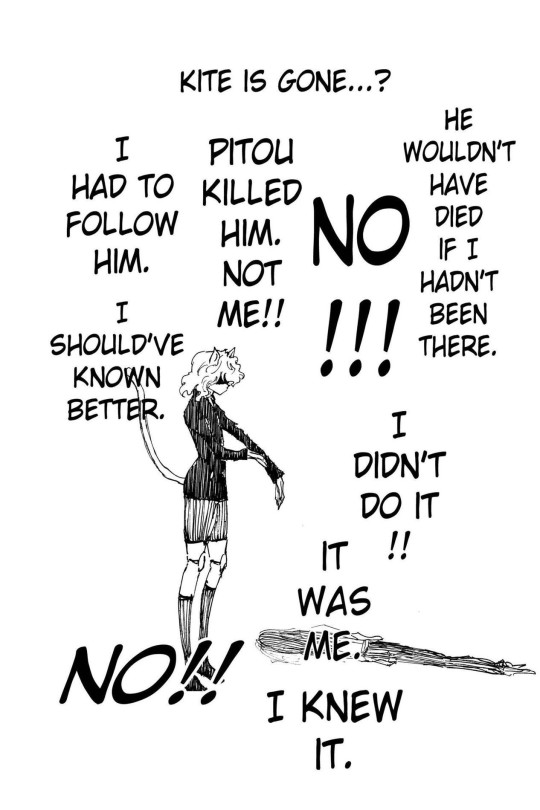
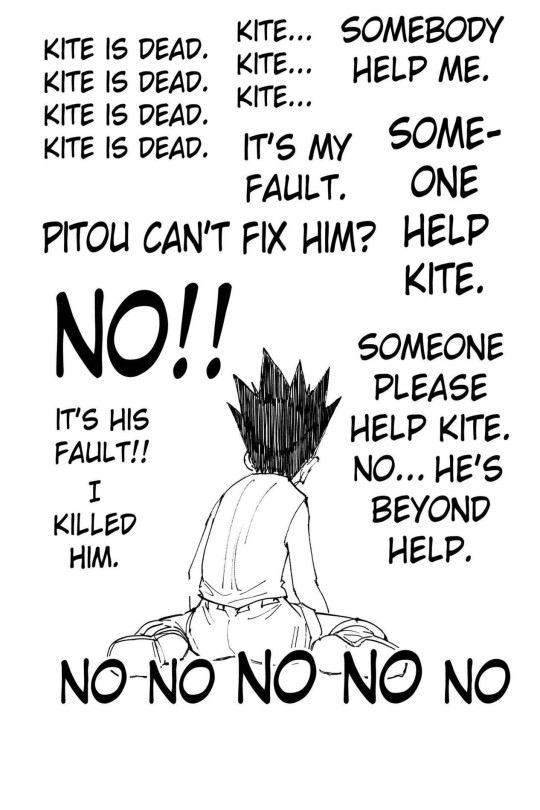
So, Gon shuts down after the reveal that Kite was dead all along and his stunned and racing mind is disjointed and contradictory. Most of his statements fit into roughly three categories of desperate thoughts:
Vehement inability to process that Kite is dead. From the statement being repeated multiple times to the amount of "no"s everywhere on these pages.
Taking the blame for Kite's death, in a frankly horrifying show of self-hatred (especially given the context of what comes next).
Blaming Pitou and proclaiming that he "didn't do it" in an attempt to absolve the weight of his guilt.
Heartbreaking. But there's one thought here that's a bit different.
Throughout all of this, Gon has been adamant that Kite, and by extension the situation, can be "fixed" - after all, most every issue that's come up before on his adventures could be resolved nicely. But now, suddenly, it can't. Gon can't stand feeling powerless or helpless, and now he finds himself more helpless than he's ever been. And we get this.
"Somebody help me."
Gon is independent. Gon has a burning need to prove his worth through his own strength. Gon has a bad habit of equating "taking responsibility" with fixing things all by himself and rejecting help from others.
Gon has never pleaded for someone to save him before.
And it's just. Holy shit. Holy shit - he's a kid. He's just a kid. And in just a few pages, he's going to make a despair-fueled decision to throw away his life just to regain any semblance of power over a situation that was doomed to be unfixable from the start. He says, "Let it end. I don't care what happens to me now.", because this is the only way he can think of to make his pain and his guilt and Pitou all just stop, by losing himself to all of his power instead of his grief.
#hi. i'm sad and i decided to make it everyone else's problem.#i know i'm stating the obvious here but. ah well. i did say i was here to share the sadness#storyrambles#hxh#hunter x hunter#gon freecss#thank goodness a certain best friend of his actually did show up to help him huh...?#killua as always snapping him out of his own darkness...#hxh meta#<- does it count#omg should i use my analysis tag? i'm gonna.#call me ace detective the way i am ace. and also a detective#hxh spoilers
458 notes
·
View notes
Text

this part makes me emotional, because yes, ging is alive and well and gon's mother is nowhere to be seen but maybe alive or dead we don't know (though I believe in the pregnancy stone's theory until togashi says otherwise), but at that moment gon thinks his parents are dead and he is protecting a cub who just lost his mom and has no parents just like him, and sorry for the spam but just look at his little face. he's crying but feeling so determined, and he's protecting the foxbear against kite who thinks the best option is to kill the cub. he wants to take care of the foxbear even if it's hurting him. and all this before kite finds gon's look similar to ging's and asking gon about it
343 notes
·
View notes
Text
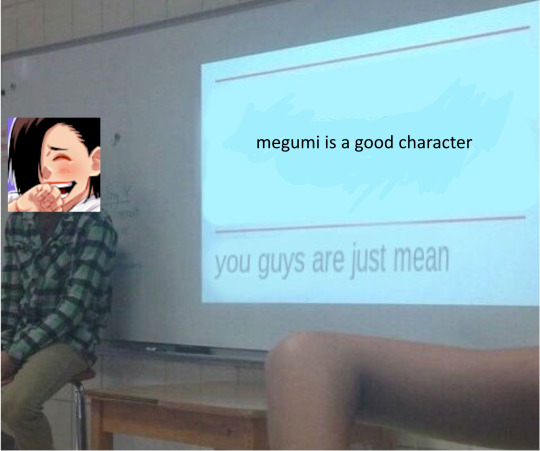
So I was genuinely surprised last week when we were finally shown Megumi's mental state inside Sukuna and he was predictably at his lowest point ever, and instead of sympathy from the fans most of the responses on twitter I saw were people mocking him.
Which I am going to assume comes from a misunderstanding as his character. You see Megumi doesn't fit into the role of the black haired supporting protagonist / rival well. He's not Sasuke, he's not Uryu Ishida, he's not Yuno but he's not meant to be a rival or even a typical shonen character who's progress is only measured by a series of power ups. Megumi is perhaps one of the most subtly written characters in the manga, and perhaps he's hard to sympathize with because he doesn't fit into easy to udnerstand shonen tropes. Which is why I will try to explain his arc below and why Jujutsu Kaisen does it like no other manga currently running.
1. Meet Potential Man
Let me introduce you to the worst meme on twitter.

Megumi's inability to live up to his potential to reach his full power as a sorcerer is probably his biggest flaw, one that is rightfully called out by the narrative again and again, but apparently an intentionally written character flaw is bad writing.
It's covered in Gojo's "Swing for the fences" speech.
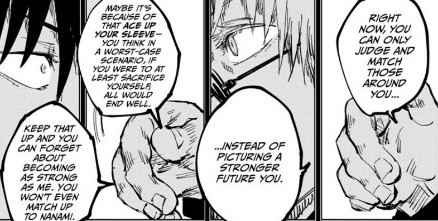
Gojo notices Megumi bunt in the baseball game and decides to confront him about it later. He highlights that while bunting is alright in baseball, and it's good to sacrifice yourself so your teammates can advance in a team sport that being a sorcerer is a solo sport. No matter what Megumi is going to reach a point where he's forced to fight alone, and instead of trying to push himself to be as strong as he can be he intentionally limits himself to cooperate with the sorcerers around him.
Basically, the opposite of Gojo who literally cannot fight with other sorcerers because he won't be able to fight at full strength as they just get in the way.
It's not just that Megumi can't use the ten shadows to its full potential, something pointed out by Sukuna, and then later again by Gojo, it's also that he always prioritizes either the group or someone else above himself when trying to decide how to act. Megumi is a semi-decent strategist so this is not necessarily a bad thing, but because of Megumi's tendency to care more about trying to live up to other people's expectations towards him, and what other people need of him rather than his own needs he doesn't have the attitude necessary for sorcery, especially since the strongest sorcerers don't take others into account at all and act like living calamities.
Megumi doesn't look at himself, he looks at the people around him. He judges himself based on what the people around him want from him, not what he wants. This is going to be a continual theme in his arc.
Sukuna is a living calamity, the definition of the attitude a strong sorcerer has, Gojo Satoru wields sorcerery only for himself, and is a sorcerer because he finds exorcising curses and using his god given talents to be fun for him.
Megumi's reason for fighting, his self worth, are all much, much less than the strongest characters in this series which is why he continually fails to live up to his potential. It's not because Gege is not good at writing or Megumi is a disappointing character, but rather he's been written as someone with tremendous potential under the pressure to live up to that potential but who continually fails to do so. Megumi's low self-esteem, low self-worth, and lack of self-identity explains both his failure to progress as a sorcerer something that requires selfishness and self-identity to reach greater heights in, but also his tendency to pick the suicide option with Mahoraga because Megumi genuinely believes compared to the others even just his classmates his life is simply worth less.
So potential man, is an intentionally written character flaw already called out in canon. The more interesting question is why does Megumi fail to live up to his potential.
2. Meet The Original Potential Man
So, I said that Megumi is not like a lot of characters in Shonen Jump but that doesn't mean he's entirely unique. To help explain Megumi's inability to live up to his potential I thought it would be helpful to compare him to a character he's clearly inspired by.
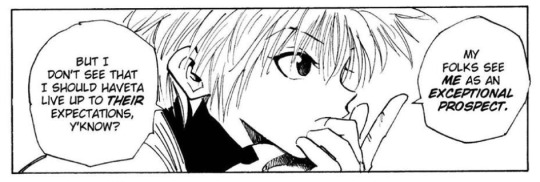
Killua Zoldyck, is the deuteragonist of a manga called hunter x hunter. You may have heard of it, Gege certainly has. Killua is born into a family of assassins who all have supernatural powers. The assassins inflict incredibly harsh training on their children from birth in order to raise them into assassins because their potential as assassins is all that matters. They also start with a "Z".
Killua is apparently the most talented Zen'in... I mean Zoldyck of this generation, though he's still young so he's weaker than his father and brother he's expected to easily surpass them one. Which is why Killua's family has already decided for him that he's going to be the next one to take over the family, Killua's opinion doesn't matter. Illumi and Silva are both setting him up for success by forcing their "help" upon him. Several other members of the family even point out that Killua probably doesn't have the attitude to be the head of the family, but what does it matter when he's got such great talent?
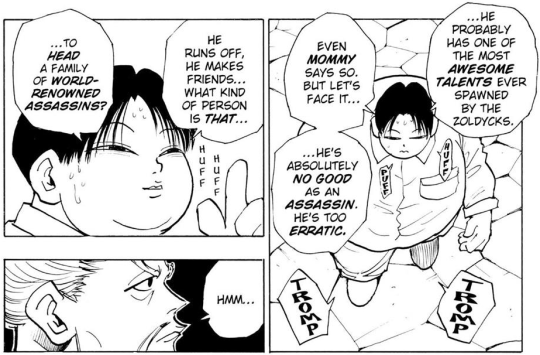
Killua is a complicated victim. He's a victim of many things, familial abuse is the most obvious one because the Zoldyck have a nasty habit of torturing their children, but the less obvious one is grooming. Not in a sexual sense, but rather the adults in Killua's life have decided to use their authority over him to manipulate him into becoming what they want him to be - the next head of the family.
What's insidious about this is the Zoldyck's don't just torture or beat Killua into submission, they will use any tool in their arsenal, familial love, emotional blackmail, threats, all to undermine Killua's agency and choices in order to make him not only do what they want to do but make him think he has to grow into the person they want him to.
Grooming not in a sexual sense, but definitely in a psychological sense, an adult using their authority as an adult over a child and their maturity to manipulate that child into becoming what they want them to be instead of letting that child grow naturally. When it's used in a sexual sense it's when an adult establishes a connection with a minor, and then uses that connection in the long-term to manipulate them into having a relationship and lower the child's inhibition. Think of that, but without the sexual part - an adult using their relationship with a child often in a long-term manipulation to lower the child's inhibitions and make them more malleable and raise them to do what you want them to do.
Killua has not been sexually groomed, but he has been groomed by both his parents and his brother to make him more suggestible to becoming the family head which is something he explicitly does not want to do. Not only did Killua's family only raise him for the purpose of becoming an assassin and taking over the family one day (raising him as a child into an adult, his emotional maturity, his health and well being are all secondary priorities to what Killua can do for his family) they also manipulate him into thinking he has no choice other than being an assassin.
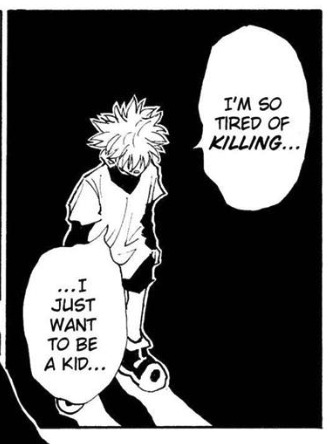
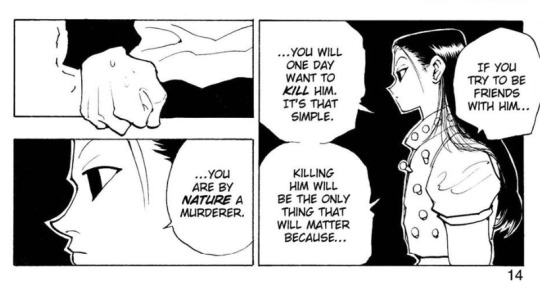
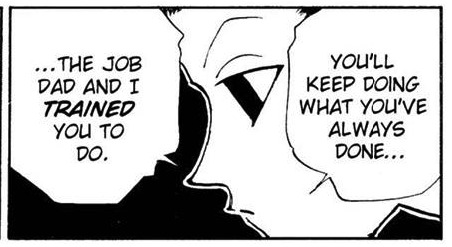
Killua is a kid put through extremely harsh training from a young age, to do a horrible job that is being an assassin that doesn't let him make normal friends or have a normal life. On top of the physical abuse he's already endured, whenever he expresses a desire to do something else in his life, his parents send Illumi to emotionally manipulate him into thinking that not only is he a natural born killer, and therefore a bad person who deserves all the abuse he's been put through, to further convince him that his only path forward is to be an assassin.
Killua is a character who has a lot of power, but little agency. Agency, in fiction is the ability a character has to take action and make decisions for themselves. Despite Killua starting as a more powerful and more savvy character than Gon, he has little agency and is often very passive. He doesn't act, he reacts. Even running away from his family is a reaction. We don't really see what he wants in life, we just know that he looked at his family and went "NOT THAT". However, his entire identity is still formed in response to his family's abuse. Even when he gets farther away from them, Killua doesn't really do what he wants, he does what Gon wants, and follows around Gon.
However, it's very understandable why Killua doesn't act with a lot of agency, when Killua does try to make decisions his family always shows up to undermine him and make another attempt to emotionally manipulate him into doing what they want. It's not always Illumi showing up to spook him. Silva pretends to be a loving dad for five minutes and has a heart to heart conversation with his son, and lets his son go adventuring with his friends but that too is a manipulation. He only did so to make sure Killua would eventually come back, by giving Killua more positive memories that would make it harder to make the decision to leave the family.
With the extent that Killua's family goes to sabotage any decision he makes, it's no wonder Killua is so passive and afraid to make his own decisions. It's almost like a character flaw he's gotta work on.
Now here's where I'm going to blow your minds. Megumi is an incredibly similar character to Killua, they are both the victims of longterm grooming however people don't like to acknowledge Megumi's victimhood. That's because in Killua's case, his abuser looks and acts like this.
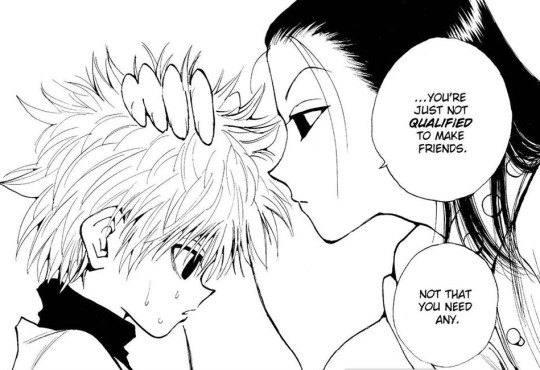
Killua's abuser Illumi is a creepy guy who looks like the girl from the grudge, telling him he's not allowed to make friends and giving off such rancid vibes that he's obviously a bad guy. Whereas, Megumi's groomer this this guy.
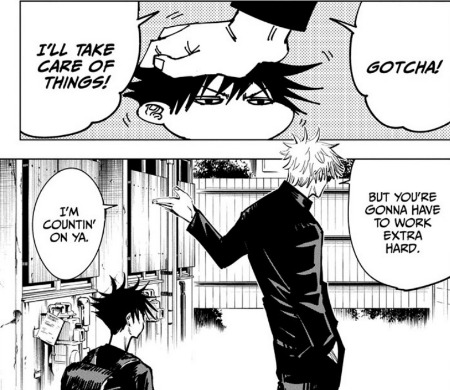
Gojo Satoru who is one of the most popular characters in the series, and who also gives speeches about how he wants to let children be able to live out their youths, which is why it's hard for the fandom to see that he has taken advantage of Megumi and stolen his youth away from him pretty much the same way that Silva / Illumi has for Killua.
Megumi, like Killua has no choice in who he wants to be when he grows up, or what kind of person he wants to grow into. Megumi, like Killua has been groomed for a young age and forced into an incredibly dangerous and life threatening job that he does not want to do, that denies him the chance of a normal life, and that does not really allow him to make many friends. Megumi is railroaded onto this path, not by his choice, but by Toji's choice, and later Gojo's choice... because he has potential. Megumi like Killua cannot leave his family and stop being a sorcerer, otherwise his little sister who is the only family member he cares about will be hurt.
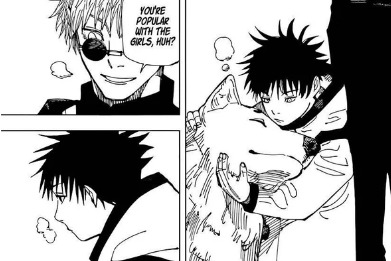
Gojo doesn't show up with an evil aura looking like the grudge girl and telling Megumi that he doesn't have the right to make friends, and that he's inherently evil and a puppet that only exists to kill people though so it's harder to tell that Megumi is a victim of the same kind of grooming that has hurt Killua so thoroughly.
This is what I mean when I say a lot of Megumi's characterization flies over your head because his victimization is written really subtly. Gojo does the same thing that Illumi / Silva does to Killua, he may seem like a stand up guy compared to those two but Megumi has about as much choice about what he can do with his life that Killua has.
Not all grooming is Illumi showing up with his spooky eyes to intimidate and coerce Killua into submission. Silva shows up to give Killua the first fatherly talk he had in his life, and lets him go from the mansion.... not because he realized he was wrong for restricting Killua's life choices and giving him no choice but to become heir.
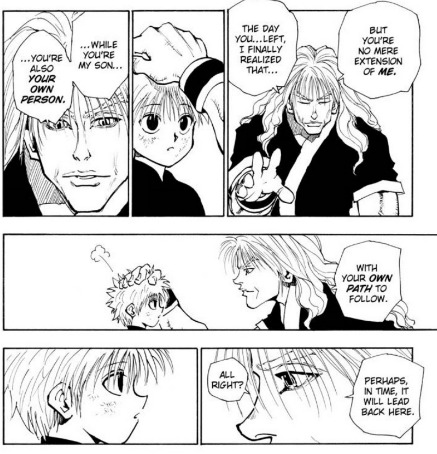
No, it was a ploy to guilt trip him into coming back because he knew if he held Killua there by force he'd just run away the next chance he got. Fear and intimidation wasn't working at keeping Killua in line, so they switched to love instead.
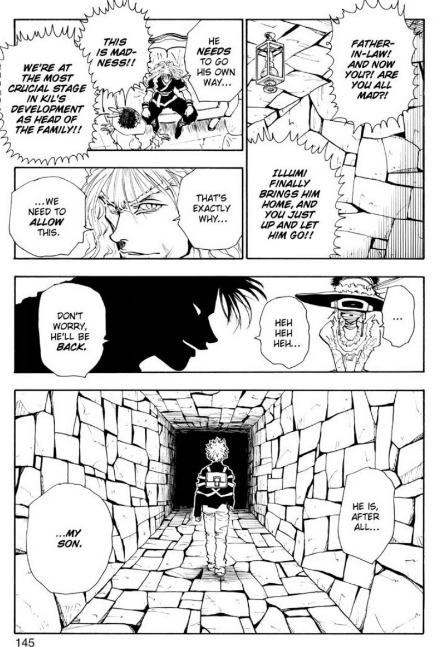
Gojo can encourage Megumi to make friends, let him hang out and spend time with Itadori, even honor his wish to save Itadori and in the end still be manipulating him into becoming a sorcerer and not letting Megumi choose what he wants to do with his life. Gojo just prefers the carrot to the stick.
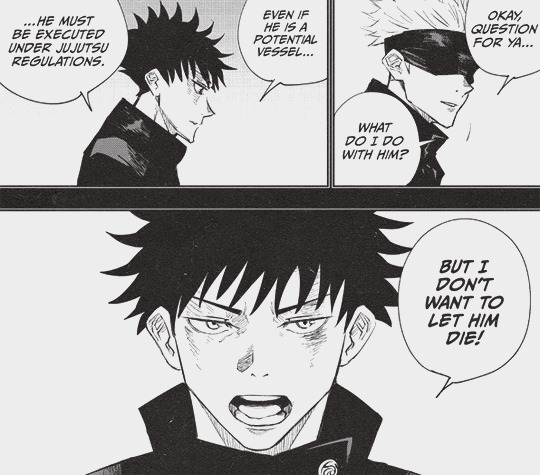
This is something the databooks confirm, that Gojo hunts prospects like Yuta, Yuji and Megumi not out of the goodness of his heart, but because they are talented students he can recruit to his cause with the added bonus that by appearing as their savior, they "owe" him.

Megumi is also a character lacking in agency, he is someone who's had no agency his entire life and what little agency he did have was stolen away from him by the adults in his life.
Let's analyze Megumi's situation for a second. As soon as Megumama dies, Toji gives up on the idea of fatherhood entirely, and decides to sell his son, literally, like in the sense of human trafficking to be raised by the highly abusive Zen'in Clan.

However, before the deal could be completed his father died in the middle of a mission. Megumi apparently saw his father so little that he didn't recognize him on coming face to face with him years alter, which says a lot about what kind of role Toji played in Megumi's life before he was outright abandoned.
Not only does Megumi believe his father just left him to run away with his new wife (Megumi's stepmother and the mother of Tsumiki) but now he and Tsumiki had to live together in a household without supervision for an indeterminate amount of time and watch their money slowly run out.
When it looks like they're about to start starving, Gojo Satoru shows up to save the day.... or not.
Gojo seems like he's offering Megumi a choice, but it's a loaded one. There's no choice in this scenario where Megumi gets to be a normal kid. The option of calling social services so this orphaned child does not starve doesn't occur to him.

Megumi's options are a) go to the Zen'in Clan and be a sorcerer where Tsumiki will be abused, or b) be a sorcerer under me where Tsumiki will be safe. The unspoken part is that if Megumi rejects his offer not only will he just let the Zen'in Take him, he'll also probably just let Megumi starve. Megumi the uh six or so year old child at this point has to sign away the rest of his life as a sorcerer, and work in order to earn money to eat.
No adult is taking care of Megumi, no one is raising him, even the food and shelter Megumi is given comes with a price tag that he has to pay back by being a Jujutsu Sorcerer and attending Jujutsu High as a teenager. Gojo even kind of subtly uses Tsumiki as a hostage to get Megumi to join with his agenda, because his offer isn't really much better than the Zen'ins but he needs Megumi on his side because he needs to raise kids to be future allies to his political agenda.
At the tender age of six Megumi signed his life away to be a sorcerer and he hasn't looked back since. Considering his severe behavioral problems getting into fights constantly at school, I think it's safe to say Megumi is about as reluctant to be a sorcerer as Killua is an assassin.
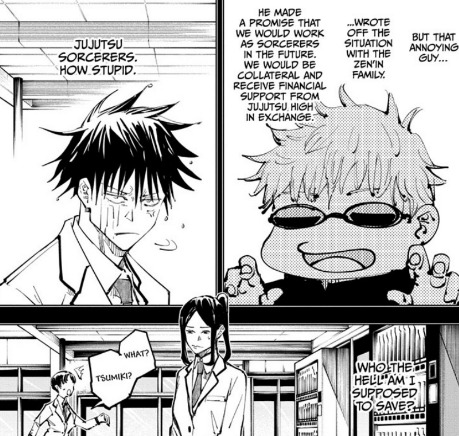
Honestly, if Megumi had phrased it like this:

"I'm so tired of being a sorcerer, I just want to be a kid."
Megumi would have a lot more fans, and Gojo would have a lot of explaining to do, but I think the brilliance of Megumi's grooming is that it's not really as blatant as Killua's. Megumi doesn't talk out loud about how he wants to be a normal kid, he's just angry at the whole world, and prone to fits of violence because he's mentall unwell.
Another way in which he parallels Killua, by the way.

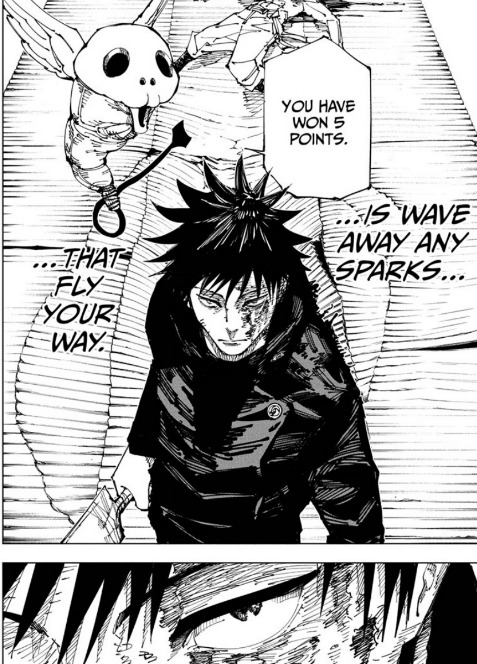
Megumi does not talk about his lost childhood out loud. Instead of knowing his thoughts on the matter, instead we are shown his behavior, the effects of having his childhood taken away from him and how unstable it makes him and left to ponder as the audience what Megumi himself thinks of this.
The same way that Illumi steals all of Killua's agency away, robbing him of the chance to be anything other than what the Zoldycks want him to be, so to does Gojo. It's just instead of Gojo using the stick, he uses the carrot. He is Megumi's benefactor, he's the savior, for whose help Megumi owes him, sort of like repaying a loan with interest.
Gojo tries to shape Megumi into Gojo Satoru 2.0. Or maybe a second Geto. That's more likely as it's Geto defection which inspires Gojo to go looking for him after neglecting to do anything about Megumi until a year after finding out about his existence. Gojo says that Megumi is going to have to work hard or else he'll be left behind, just days after Geto had left him behind. Megumi is helped by Gojo, he is protected from the clans by Gojo, he has been taken on missions alongside Gojo his entire life, Maki even refers to Megumi as a treasure that was raised carefully by him.

Gojo invests a lot of time and effort into Megumi and because of that Megumi is expected to "perform." However, he doesn't.
That's the thing, Megumi is supposed to be either Gojo or Geto 2.0 but he just can't be. THe reason why again is Agency. If Killua is limited because of his inability to decide for himself, then so to is Megumi b/c Nen and Cursed Technique Development both depend on things like imagination, ego and self-image to raise them up to their full potential.
However, Gojo has shot himself in the foot with regards to Megumi. Becoming a Jujutsu Sorcerer requires a strong identity, but Gojo by sabotaging Megumi's agency and ability to decide for himself every step of the way has robbed Megumi of the chance to form that strong identity.
Megumi, just like Killua has no sense of self and instead both judges himself according to others, how he meets their expectations, how he measures up to them - he also glorifies others while constantly putting himself down.
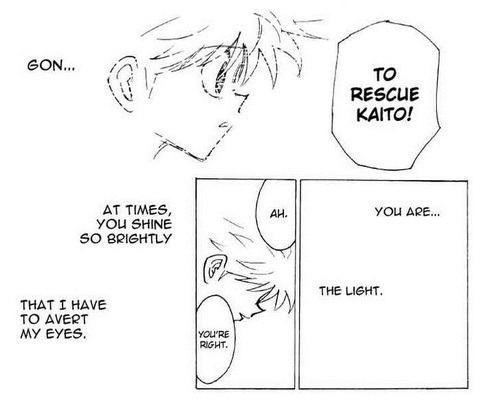
Megumi doesn't give speeches about how Yuji is like pure light, but he also refuses to let Yuji out of his sight post Shibuya, and even says it'd be better to be killed by Sukuna alongside Yuji if Sukuna does take over.
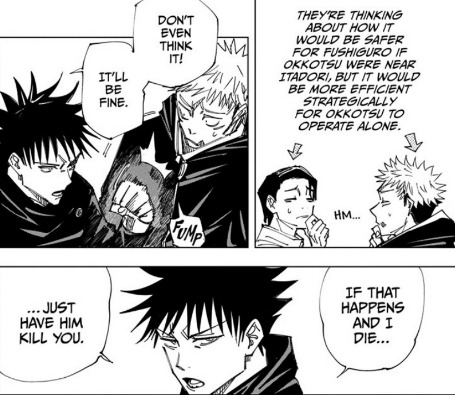
In the Chimera Ant Arc Killua defines all of his self-worth around being useful to Gon, and beats himself up for not being able to measure up to him - because Killua has no sense of self his selfhood has always been undermined by his family who wanted to make him more suggestible to what they wanted.
Megumi is flippant with his own life and very willing to lay down his life for another's sake, because Megumi has very little agency in his life and has been taught by both Gojo and his circumstances that he himself and what he wants does not matter. Megumi doesn't fight fate, and fight for what he wants because he's already been shot in the kneecaps by both Toji's abandonment, and Gojo Satoru, and he's having a difficult time just trying to stand with bullets in his knees.
Maybe, the reason Megumi is so willing to risk his life to summon Mahoraga and sacrifice himself if he thinks it will help his allies is because Megumi has been forced into a job where he's gonig to be expected to sacrifice his life for the greater good since the tender age of six years old and therefore everything in life has conspired to tell him his life is worth less than others.
Yuji isn't the first person in story to think of himself as a cog, that's Megumi. He doesn't even need Shibuya to beat him down to accept the cog mindset, Megumi is already there at the beginning of the story.

I think a lot of misunderstanding of Megumi's character comes from the fact that his grooming is more subtle and insidious, and not as blatant as Killua's, and also that it's done by a character well-liked by the fandom. However, if Megumi has all the same symptoms of Killua then it's logical to deduce that they share the same trauma
Even Megumi's summoning of Mahoraga has a tie to Killua.
There's a pattern of KIllua running away from stronger opponent that's established in HXH that's eventually revealed to be because of a needle that Illumi inserted directly into Killua's brain to mind control him to run if he faced someone that was too much of a threat.
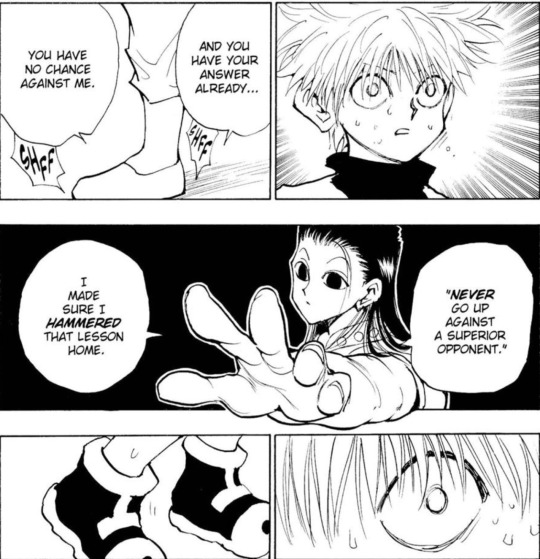
Obviously, that's just continuing the metaphor of the fact that Killua isn't able to believe in himself to face people who are stronger, because Illumi has been constantly putting him down his entire life.
Isn't this essentially what Megumi does as well?
When Megumi is faced with an opponent that's too strong or a hopeless situation, instead of running like Killua he summons Mahoraga. He does this because he doesn't believe in his ability to surpass his limits and fight, because he doesn't believe in himself or his own potential.

When is actually able to think more freely and picture a version of himself who can surpass his limits and who can do these things - these are the moments he is shown to grow.
Megumi however, for the most part isn't free. He can't think of himself as free and he can't free himself, because not only does he still have no choice about what he wants to do with his life (even if he becomes the msot powerful sorcerer in the world Gojo won't let him quit, he's gotta pay off those student loans), but he's also internalized the idea that he's not free. Not only has Gojo raised him to be a cog, Megumi has also accepted the fact that he is a cog and what he wants does not matter - the most he can do is hope that his actions will protect the people he loves and give them a little bit of happiness.
Megumi doesn't need a needle in his brain to control him and make him run away from fights and more obedient, because Megumi has already done all of that to himself with the toxic and self-harming ideas he's internalized.
Megumi and Killua having given up on themselves, try to make others happy, the same people they put on pedestals in order to make themselves feel even worse in comparison.
However, from this point Megumi and Killuas arcs go in opposite directions. You see after the Chimera Ant Arc when Killua hits his lowest point and his codependent friendship with Gon is exposed for what it is, Killua returns home in order to try and rescue his sister Alluka who is probably the reason he ran away in the first place.
Alluka and Tsumiki are both at the start of the story taken away from Killua and Megumi respectively, and with them the only genuine familial affection they ever enjoyed in their lives is taken too.

However, Alluka and Tsumiki are inversions. Alluka finds her freedom and agency, and Killua is able to reform his connection with his sister by accepting both pats of her, Alluka and Nanika. Afterwards the two of them finally leave their family home together and go off on a journey together.
If Alluka finds her personhood, Tsumiki remains a plot device. She never awakens from her coma, she's possessed instead and then murdered.
Now, here is where I point out how unfair the audience is being to Megumi. If you're a hunter x hunter fan remember all the character development that Killua gained by reforging his relationship with Alluka, how much confidence it gave him to connect to the one person who's even unconditionally loved him as a family member.
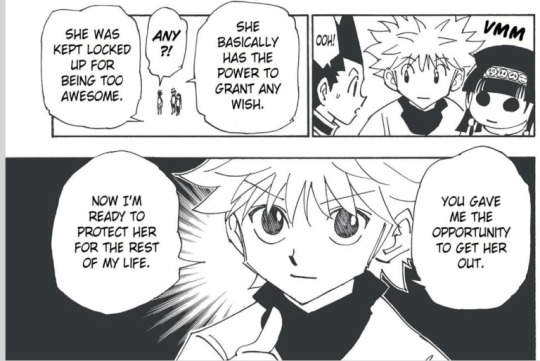
Now imagine that Alluka is brutally butchered right in front of him, and Killua has a first person point of view, because somehow in this scenario Illumi used a needle to mind control him into killing Alluka.
Do you really think Killua would be able to stand after that?
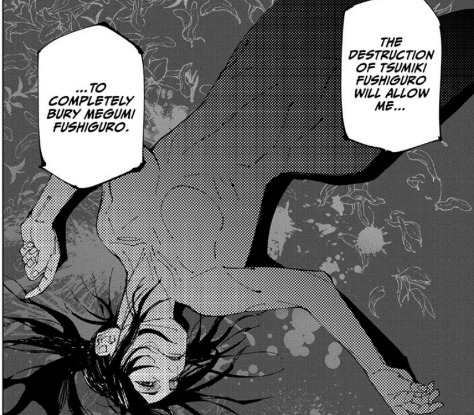
Sukuna is really just the last in line of a long line of people who've stolen Megumi's agency away from him, in order to benefit themselves. Sukuna even saw the same "potential" in Megumi that Gojo did.
Sukuna physically posessing Megumi's body, is just what both the Zen'in Clan, and Gojo Satoru have been trying to do to him in the most literal way possible. Gojo wants to remake Megumi into Gojo Satoru 2.0 with no regards to who Megumi is as a person, what Megumi's wants and needs are. No he just wants to raise someone as strong as him and pass the burden of protecting society onto Megumi, this starving orphan Gojo decided to exploit.
People have always used Megumi as a puppet for their own agenda, Naobito wanted to make him the head of the Zen'in Clan because he had the technique, Gojo wanted him to become the next strongest sorcerer / Gojo Satoru and also to replace the elders with Gojo's political agenda. They all want Megumi's "potential" for themselves to use to their own ends. Sukuna just takes what Gojo did one step further by literally stealing Megumi's body away from him and using him as a literal puppet instead of a metaphorical one. Gojo took Megumi's childhood by making him work as a sorcerer, Sukuna kills the physical embodiment of Megumi's childhood innocence by murdering Tsumiki, the only thing Megumi had in his life besides being a sorcerer, his only family, the only person he grew up with in his childhood years, the only person who loved him for who he was.
Megumi coped with what Gojo did to him the same way Killua did, by building himself around his use to others, and by building his identity around protecting others but now that's all gone. Tsumiki is gone, Megumi is trying to kill his friends, and he's already butchered Gojo Satoru.
Yet the fans are surprised that Megumi doesn't immediately get back on his feet.
However, and this my slightly optimistic ending to the post. Perhaps, Megumi is going the complete opposite of Killua, because what Megumi needed to learn was not to grow strong and confident enough to protect his sister but to learn to fight for himself.
At this point Megumi has nothing else left. It's sink of swim. He either develops a strong enough identity to regain control of his body and push Sukuna out, or he loses and the anti-Sukuna team will just have to resort to killing Megumi along with Sukuna.
Even in that case.
Megumi not being saved by Yuji is a good thing.
Because a victim who gets rescued by a hero still has no agency.
Megumi told Yuji that he needs to start by "saving me."
However, it might just be the opposite. Before Megumi can save anyone else, before he can become a protector, he has to find his own power and save himself. He has to both accept thathe's someone worthy of salvation, and at the same time he can't just passively accept the hand that Yuji's offered to him he has to actively be the one to break free of Sukuna and save himself.
Megumi can't become the strongest sorcerer by becoming the next Gojo Satoru or being what Gojo or Sukuna wants him to be. THe only way Megumi can become the strongest, is by being himself.
#jjk meta#hxh meta#megumi fushiguro#killua zoldyck#gojo satoru#illumi zoldyck#ryomen sukuna#jjk spoilers#jujutsu kaisen spoilers
402 notes
·
View notes
Text
Killua says that he will commit shinjuu with Gon. But it isn't, not really, because a double suicide implies a pact, that they both chose to die for each other. On the contrary, Killua thought that Gon's death was inevitable since the second that they accepted going after Neferpitou — which was a matter of saving Kite and alleviating the crushing guilt that Gon was self-destructing over, so it would've had little to do with Killua directly. Killua choosing to join him in that fight, while knowing the outcome, is what would have made it a double suicide, an act of love, because Gon was always going to careen right into his death regardless of what Killua did.
They don't die, so Killua's promise of devotion until death isn't fulfilled. But him bringing up shinjuu isn't meaningless, because Meruem and Komugi — their narrative parallels — do die.
Although it's not directly called a shinjuu, they fulfill the trope: ultimately, it was impossible for them to be together in this life, so they die next to each other, with the hope of uniting in the next life and continuing to be together forever, to extend this happiness that they've found in each other. But, again, it's not a double suicide, not really. Meruem's body is full of fatal toxins from the Poor Man's Rose bomb — from his fight against Netero, which had nothing to do with Komugi. He tells her that the toxins are contagious and implicitly gives her the option to leave so that she may survive. Komugi choosing to stay and keep playing with him, while knowing the outcome, is what makes it a double suicide, an act of love, because Meruem was always going to die regardless of what she did.
Fun little parallel I've been thinking about today.
#every once in a while I'll just be consumed by thoughts about the chimera ant arc and cry#hxh#hxh meta#killua zoldyck#komugi hxh#gon freecss#meruem#hunter x hunter#my commentary#my original post#killugon#merukomu
135 notes
·
View notes
Text
something something chrollo steals nen abilities and morena grants nen abilities.
chrollo steals abilities to hoard while kurapika steals them to use once, or grants them to others.
kurapika teaches a class of 20+ people working for the upper class how to use nen in order to force a stalemate- in other words, stagnation. morena "teaches" (infects) 20+ lowerclass nobodies to wreak havoc, cause anarachy, and ultimatly bring about change.
kurapika's cause being a just one that happens to benefit a bunch of awful royals while morena's cause is objectively, profoundly malevolent while also inconviencing those same awful royals.
morena wanting societal change for the worse while halkenburg wants it for the better. kurapika wanting personal justice (arguably for the better) chrollo wanting personal justice (arguably for the worse).
halkenburg coming to terms with being willing to sacrifice the lives of his own (consenting) people for the betterment of society. morena being willing to do the same - for the opposite cause.
both chrollo (the spider) and kurapika struggle to justify doing the same. personal justice does not make their loss any easier to bear or grief any easier to withstand.
kurapika, chrollo, morena, and halkenburg all having their own sets of disciples.
all of them being attached to biblical imagery. all of them fighting for wildly different causes.
all of them completely willing to throw away their lives.
something something something it's a heavy cross to bear
#listen maybe i will have more coherent thoughts some other day but for now all i have is puzzle pieces i can bash together#hxh spoilers#hxh manga spoilers#succession war arc#hxh#hunter x hunter#txt#phantom troupe#heil-ly mafia#morena prudo#kakin mafia#halkenburg#prince halkenburg#hxh meta#hxh manga#screeds#chrollo lucilfer
136 notes
·
View notes
Text
The Rebel Heir: A quick analysis of the character arcs of Killua Zoldyck and Reo Mikage
What do Reo Mikage from Blue Lock and Killua Zoldyck from Hunter x Hunter have in common? Much more than one would like to believe. Both are characters with similar arcs and codependent relationships. I wanted to analyze both of them because I think their differences and similarities are mind-blowing, but also because they are a type of character that are extremely interesting and the moral of their story inspires thousands of kids who may be watching their respective series.
this meta is gonna have spoilers of both series!!!!
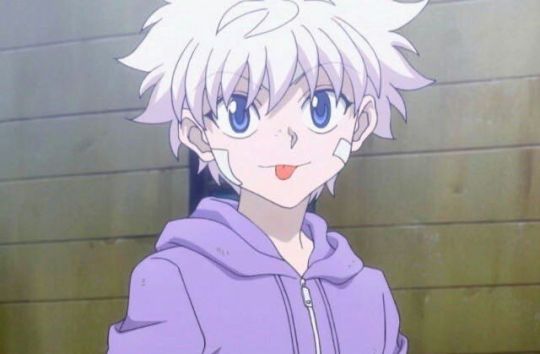

They both come from wealthy, patriarchal families where their future lies in being the heir to their parents' businesses. Killua is the heir to a family of assassins, while Reo of his family's multibillionare company. Both are manipulated by their families in order for them to remain the heirs. In Killua (and because the series allows it) the manipulation is more explicit: torture, harassment and warnings. While in Reo his father mentions to him that it is “for his own good” and that “only the chosen ones can play soccer, you are not one of them.”
Killua's dad (Silva) and Reo's dad are shadows of what Killua and Reo should become: a big killer who runs the family and a businessman in a traditional family. Its their "destiny"
The two rebel against this fate that seems boring/painful to them and decide to have their own lives for their own. In the way, they meet someone who represents freedom and an escape from the life they don't want. That other person offers them an alternative of hope and friendship: A promise that their lifes are gonna change forever.
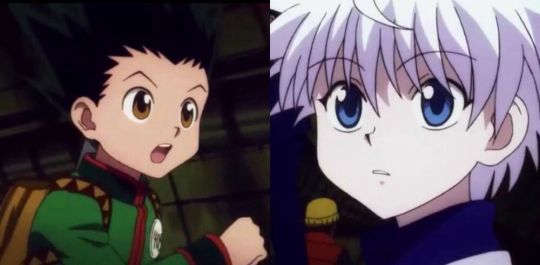

Both Reo and Killua become devoted and codependent to those people. The other two people may seem less involved in the relationship from an outside perspective, but both Nagi and Gon appreciate and value their partner. I want to emphasize that for both Reonagi and Killugon, the other is their first real friend. All of these children/teenagers lived isolated from the world (or self-isolated) so this lack of experience in friendship is what makes the dynamic of both of them can be seen as out of balance. Also, because of their family background, both Reo and Killua see friendship as a “transaction” in a sense that for them, they only have value if they prove valuable to their partner, in Killua's case as a battle companion/protector and in Reo's case as a soccer player.
Both killugon and nagireo promise to be together. Gon and Killua under the stars and Nagi and Reo before entering blue lock. I don't consider Nagi and Gon to have similar arcs (somewhat in the sense of having to find their own dreams, Gon outside of his father's expectations and Nagi from something that motivates him as Nagi, but thats a type of hero journey), but what I do consider them to be similar in is how the fandom perceives them: the one that “dominates” the relationship. I think this is more because for both Gon and Nagi (before epinagi) we weren't much in their thoughts (Nagi and Gon externalizes their thoughts while Killua and Reo Internalizes), however Gon and Nagi are devoted to Killua and Reo, and this has been proven a thousand times.

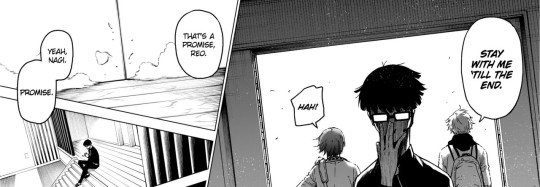
** I wanted to emphasize here that those who make the promise to stay together are Nagi and Gon respectively, emphasizing the desire to want to be with their partner.
Both couples have a separation arc that meant stretching the established dynamic to the maximum. Blue Lock challenges Nagi and Reo as a duo of genius/talented learners, the Chimera Ants challenge Gon and Killua as friends and companions with and horrible war happening.
These arcs (2nd selection and CAA) allows to explore their relationship in its entirety. The lack of experience of previous friendships is noticeable in the handling of communication. Of course, here there are internal problems of the characters (Killua and Reo with problems of self-worth, Gon going through his first grief and Nagi learning that he has to motivate himself and improve and that being a “genius” is not enough), but there are also external problems that strain the relationship, in the case of Killugon is more obvious because the circumstances caused them to be involved in a war, in the case of Nagi and Reo is Blue lock itself and the encounter with other players (Isagi) that represent a threat to the dream they share.
Both Killua and Reo have problems communicating clearly and being able to express their feelings and fears to their partner. Killua wanted to ask Gon what their relationship meant to him, while Reo wanted to show himself happy with Nagi's changes. They both failed and that lack of communication leads to tragedy. Of course this is not only their fault, Gon isolated himself and Nagi has the social skills of a cactus, so it was not easy for Killua and Reo to affirm the relationship with words.
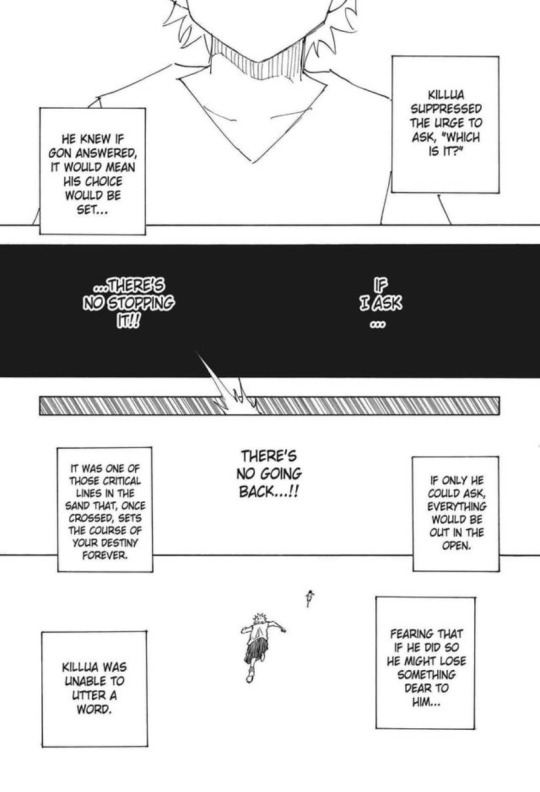
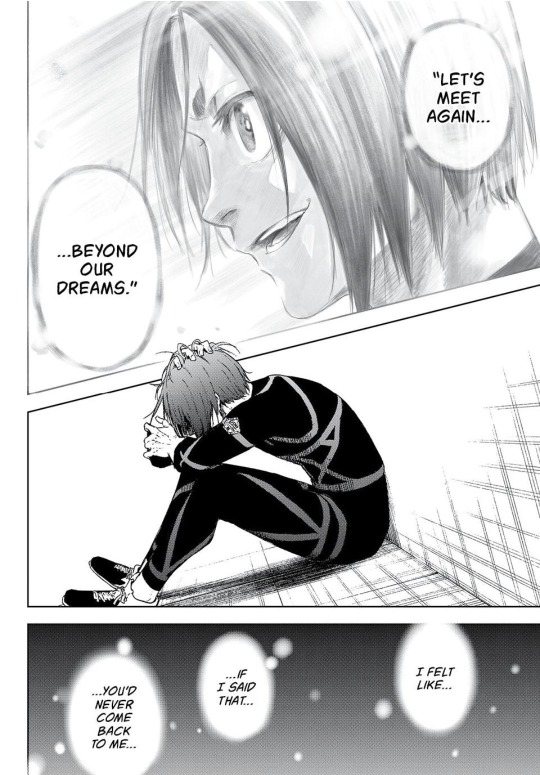
The insecurities of both, added to the circumstances and the poor communication with their partners lead them to having to show their most vulnerable side to others. Because of these misunderstandings and lack of maturity from Nagi, Reo, Killua and Gon, the relationship ends in a separation arc where they have to learn to grow apart from each other. It's difficult, because for both Killugon and Nagireo, the other is their first real friend. All of these children were isolated people who recognize in each other a first deep and sincere friendship. Likewise, both Nagi and Gon say harsh words to their partners “Because this is not your fight!” and “I don't care anymore, you are a pain”. Both words come from frustration, but they are hard to hear, specially from the person you cared the most.
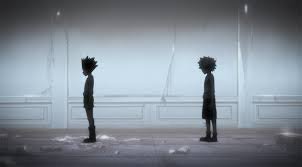
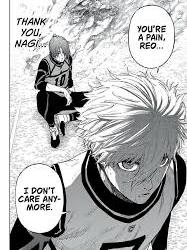
Now is when things start to diverge. Killua, in the process of saving Gon, is reunited with his sister on a journey that depicts Killua facing his traumas (his family) and being able to rise up so he can show devotion to his friend once again, but this time it's different, this time Killua wants Gon to apologize. This is the first time Killua asks something in return from Gon, their relationship is changing. Reo, on the other hand, starts to work on himself, in the process of wanting to show his value to Nagi he creates his ability “The chameleon”, a beautiful power that allows him to copy others, but also allows him to face his traumas: if, in the words of his father, Reo was not “chosen” to be able to play soccer unlike the others who were, he has no choice but to copy those “chosen ones”. Reo and Nagi's relationship also changes, Reo's goal now is to show themselves on the field as equals.
At the end of Hunter x Hunter, Killua decides not to follow Gon after saving him from his horrible contract nen. Now Killua has other priorities: helping his sister who needs him and protect her. Killua understands that his relationship with Gon has changed and that while they are still friends, he needs time to heal and to be able to be with his sister Alluka. the penultimate chapter of the anime ends with Gon and Killua going their separate ways, but this time Killua has a dream to protect and gon returns home, we complete the full circle and their relationship “swings”.
On the other hand, in the current NEL arc in Blue Lock, Nagi and Reo end up on the same team. Nagi and Reo's relationship also changes, it is now Nagi who seeks out Reo and asks for his help. However, due to Nagi's lack of insight, the relationship becomes unbalanced again: the moves they make are no longer scoring goals and his mentors tell him that a separation is imminent.

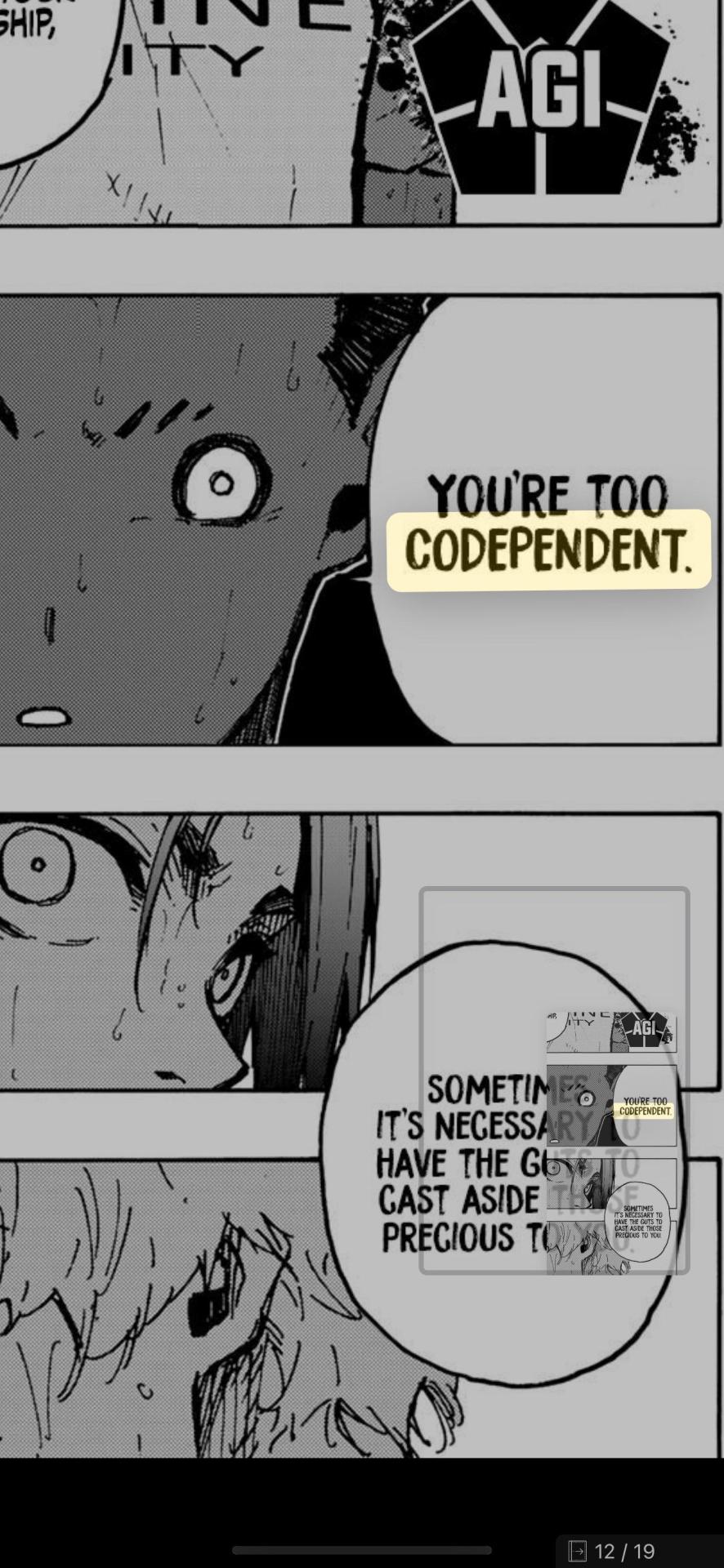
Reo is not doing it on purpose. He has always had a habit of “overwatering” Nagi even before the breakup, and Nagi is telling him all the things Reo wanted to hear. He's simply too proactive to the point that he ends up helping to enable Nagi's lazy habits. That said, that's mostly Nagi's fault for being lazy and continuing to rely on people even though he knows it's something he needs to improve.
Killua decides to part ways with Gon temporarily and finds a dream that goes beyond just caring for Alluka: Killua, as the caring and kind child he is, finds his worth in caring for others. But now, Killua must ask himself the question of what he wants for himself. He must find his worth beyond an “other.”
Reo must ask himself the same question and understand that his friendship with Nagi goes beyond being just soccer players: they are friends and their bond is unbreakable. He doesn't have to be just Nagi's "wingman", he can also score his own goals and be an indispensable midfielder for the match.
I hope you enjoyed the comparison. Both characters are amazing and they are so loving and caring about their friends that I find it inspiring!
#my meta#blue lock#hunter x hunter#bllk#hxh#nagireo#reonagi#killugon#gonkillu#reo mikage#nagi seishiro#killua zoldyck#gon freccs#bllk meta#hxh meta#blue lock meta#hunter x hunter meta
68 notes
·
View notes
Text
what i like the most about Hisoka saying he's perfectly normal , is that for something to be "normal" you need to define a norm and also what makes you deviate from it. & usually what a person considers normal is heavily influenced by the culture they grew up and and are surrounded by now
which brings me to two points
Hisoka's baseline might just be ... he himself? He's a loner, usually sits by himself & rarely has meaningful interactions with others. Of course he's influenced by the culture around him, but spending as much time in his own head as he has i think he might really just have come to the conclusion that the things he wants reflect the average desires around him which brings me to point two
I don't think he's that wrong? Not in a sense of he isnt a freak, right. Especially as a reader of the manga seeing him say that he's "just a guy" is funny. He does not act "normal" he's clearly strange, the way he conflates sexuality and violence is not the baseline how people interact with these two things. BUT looking at the society of hxh and in particular looking at hunter society i can see how you would end up with the mindset that youre not that strange. He kills people yes, but hunters are allowed to do that, he straight up tells netero (who could have pulverized him on the spot) that he wants to be a hunter so he can kill people. His reputation in havens arena is also for being killer. People were shouting for murder in his fights. Like they paid to see him be violent! And serial killer for the joy of it also seems to be a geniune type of people who can very very openly exist and he is simply part of that cultural subgroup & within that realm the things he wants are, well still fucked up, he still wants to kill for his own pleasure but i can absolutely see how he'd end up with the mindset he's got
63 notes
·
View notes
Text
The existence of Jesus (or I imagine that's what Chrollo and the gang are referencing and that church in Meteor City) in the verse of HxH makes me think a lot.
I'm not even talking about him possibly being a NEN user who became a political figure, but rather that the Bible in general must be so different.
Because…where is Jesus from? Is there an equivalent of our countries in the verse? Isn't Jesus Jesus of Nazareth? Wasn't he born in a manger somewhere in Judea? The entire Bible makes references to peoples and countries in our world. How would Jesus be crucified, why? I love history, especially religions because they are extremely connected to their respective peoples and their cultures and worldviews, the existence of Christianity in HxH simply rents a tripex in my head.
#hxh#hunter x hunter#hunter x hunter meta#hxh worldbuilding#chrollo lucilfer#phantom troupe#???#hxh meta
38 notes
·
View notes
Text
Hisoillu is so insane to me. "You're the only motherfucker who can handle me" but in the absolute worst way possible. Freaks who understand each other better than anyone else ever will and also not at all. Characters who are constantly either looking up at or looking down on others and for the first time are able to have something balanced. "You're the only one who can kill me. If I don't get you first." Insane. I need 10 more fucked up little fics
#gnawing at the bars of my enclosure#type: meta#i guess??#fandom: hunter x hunter#hxh#hisoillu#hisoka morow#hxh hisoka#hisoka hxh#illumi zoldyck#hxh illumi#illuhiso#hunter x hunter meta#hunter x hunter analysis#hunter x hunter#hxh meta
171 notes
·
View notes
Text
okay but killua becoming addicted to gambling the way he did for like, 5 secs during the greed island arc makes sm sense from a psychological standpoint, at least to me. 😭
like…
“it’s not like it’ll KILL me!”
*sees a man die after hitting the jackpot 5x in a row and using the exact same die that killua was*
*literally continues to do it anyway* 💀
also,
killua: assassins NEVER take risks. 😤
also killua: *becomes a gambling addict in, like… two seconds*
#he’s just like me fr ngl#hunterxhunter#killua#killua zoldyck#hunter x hunter#hxh#hxh killua#hxh killua zoldyck#hxh greed island arc#greed island arc#greed island#hxh greed island#character psychology#character trauma#meta#hxh meta#anime meta#character meta#meta analysis#analysis#anime analysis#character analysis#media analysis
166 notes
·
View notes